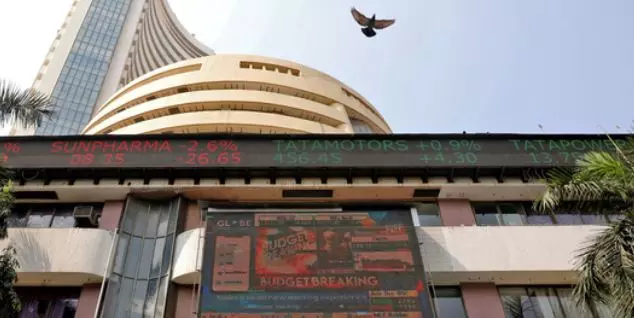Global Market Meltdown Singes Indian Stocks
Domestic institutions intervene to steady market, yet investors lose Rs 14 lakh crore

Mumbai:US President Donald Trump’s unprecedented move to disrupt an eighty-year-old global trade system spread panic in Asian markets, leading to activation of circuit breakers to stem fall in Japanese stock market, Hong Kong stock exchange witnessing its worst sell off since 1997, and intervention of Chinese sovereign funds to steady Shanghai stock market.
The Asian ripple effect caused the Sensex to open gap down. The Sensex and Nifty-50 opened five per cent lower than Friday’s closing. The Sensex touched a low of 71,425 down by 3,939.68 points intraday, wiping out `19 lakh crore investor wealth.
The Indian markets, however, fared better than global peers for the third consecutive session since the US announced its reciprocal tariffs on April 2 because of the Indian economy’s domestic focus, comparatively lower tariff on India and the country’s diplomatic advantages with the US over other negotiating nations.
By the time of closing hours, the Sensex staged a smart recovery and ended the day 2.95 per cent or 2,226.79 points at 73,137.90 as domestic institutions intervened to control panic selloff. Amid global meltdown, foreign portfolio investors (FPIs) sold equities worth `9,040.01 crore, while domestic institutions stepped in to buy stocks worth `12,122.45 crore to minimise damages.
The broader market, however, suffered the most as BSE Mid-cap index fell 3.46 per cent and BSE Small-cap index fell 4.13 per cent — leaving investors to lose `14.09 lakh crore.
"Markets took the weekend defence of tariffs from the Trump administration as indication that US might not soften its stance in response to China retaliation and overall, the global growth and inflation outlook has suddenly changed dramatically with escalating trade war," said Satish Chandra Aluri, equity analyst, Lemonn Markets Desk.
With China announcing a reciprocal tariff against the US, investors raised concerns about the US hiking its tariffs on China yet again, which lead to a series of tit-for-tat moves, and a potential disaster for the global economy.
The plunge in the stock markets in the second biggest economy in the world, which were closed since April 2, set the tone for the day. The People’s Bank of China’s decision to lower yuan’s exchange signals its intent to devalue the Chinese currency to fight the trade war in response to the weakening US dollar — a prospect that could set off a domino effect in other countries. A similar competitive devaluation by several countries triggered the Global Depression in 1930.
"The Indian markets were relatively better placed compared to the Asian peers on account of lower tariffs and less reliability on US exports. Amongst sectors, the metal Index plummeted almost seven per cent on US-China trade war escalation with Beijing imposing export restrictions on some key rare metals," said Siddhartha Khemka, head - Research, Motilal Oswal Financial Services.
Volatility index or NSE's India VIX rose 65.70 per cent to 22.79 per cent compared to previous close of 13.76 per cent, after touching a high of 23.19 intraday indicating high market volatility to persist in coming days.
"The current market conditions appear quite troubling, as evidenced by the VIX spiking over 65 percent in just one day. This dramatic increase in volatility indicates significant uncertainty among investors. However, the notable recovery observed in the last hour of trading highlights the inherent strength and determination of domestic participants, who are showing resilience even in challenging circumstances," said Rajesh Bhosale, technical analyst, Angel One.
“Market is unable to quantify the uncertainty unleashed by tariff war. It is reacting to every news coming through. Likely that the unfolding events will keep sellers on an aggressive sell mode and buyers on a reluctant buy mode.It will be futile to predict future events," said Nilesh Shah, MD, Kotak Mahindra AMC.
Among sectors, the BSE Metal index emerged the worst performer for the second consecutive session, the BSE & Nifty Metal index falling 6.22 and 6.75 per cent respectively.
Key losers included Tata Steel (-7.26 per cent), JSW Steel (-7.53 per cent),Vedanta (-6.34 per cent) and Hindalco (-5.92 per cent)
Other heavy losers included BSE Realty (-5.69 per cent), BSE Capital Goods (-4.34), Auto (-3.77 per cent) and Bankex (3.37 per cent) as all sectoral indices registered sharp fall barring FMCG (-1.29 per cent) and Power (-2.09 per cent).
GRAPHIC POINTS
The Sensex fell 2,226 points mimicking other Asian markets, leaving investors poorer by Rs 14 lakh crore
Chinese markets which opened for first time on Monday after US tariff set off panic sale
Unprecedented uncertainty broke set off safety mechanism in Japanese markets
China’s central bank fixed a lower exchange rate for yuan in response to weakening US dollar.
Weakening of the US dollar and Chinese yuan could potentially set off a chain of currency devaluation by other countries.

